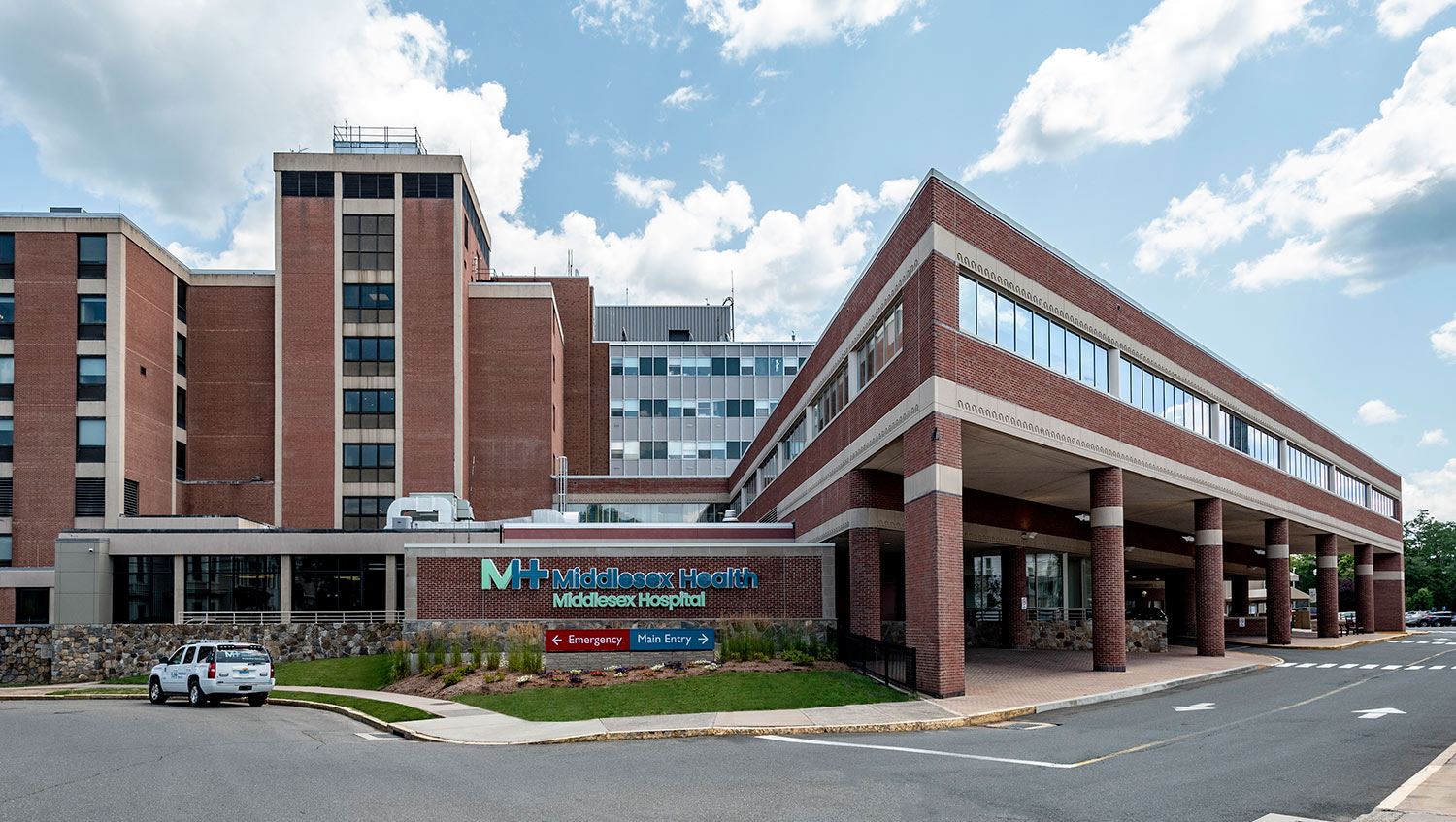Patients with digestive diseases often have concurrent conditions and require the help of many different specialists. Someone with Crohn’s disease, a chronic inflammatory bowel disease that affects the lining of the digestive tract, for example, may have other autoimmune disorders like rheumatoid arthritis or thyroid disease, and often suffers from anxiety, which can exacerbate symptoms.
 “You want to hit it from all sides,” says Dr. Nadeem Hussain, Middlesex Health’s Chief of Gastroenterology. Indeed, Middlesex’s new Center for Digestive Health does just that. “The concept of the center,” Dr. Hussain says, “is to bring all the experts together so that everyone is working as a team to make things easier for the patient.”
“You want to hit it from all sides,” says Dr. Nadeem Hussain, Middlesex Health’s Chief of Gastroenterology. Indeed, Middlesex’s new Center for Digestive Health does just that. “The concept of the center,” Dr. Hussain says, “is to bring all the experts together so that everyone is working as a team to make things easier for the patient.”
Launched in October, the center was the brainchild of a Middlesex administrator who recognized that the hospital’s GI specialists were often finding overlapping conditions in patients that required referrals to other specialists. The center, which coordinates care among physicians from many specialties, along with mental health professionals, physical therapists, and integrative medicine practitioners, provides a more efficient way for patients to get the care they need. “We make sure patients get from point A to point B, and do everything in a timely fashion,” says Dr. Hussain.
While many of the center’s patients are referred by Middlesex-affiliated gastroenterologists, people in the community who are experiencing GI discomfort can also call the center’s nurse navigator, Stacy Daddona, directly at 860-358-2789. She refers patients to the appropriate specialists, answers any questions they may have about their diagnosis, and makes sure patients secure appointments for necessary tests or doctor visits. “I connect the dots,” explains Daddona. “I provide support for patients and make sure that they have a smooth transition between specialists.”
Managing Irritable Bowel Disease
 Irritable Bowel Syndrome (IBS) is probably the most common digestive disease, according to Dr. Hussain, affecting 10 to 15 percent of the population. Patients with IBS typically experience bouts of abdominal discomfort and pain, which might include bloating, gas, diarrhea, or constipation.
Irritable Bowel Syndrome (IBS) is probably the most common digestive disease, according to Dr. Hussain, affecting 10 to 15 percent of the population. Patients with IBS typically experience bouts of abdominal discomfort and pain, which might include bloating, gas, diarrhea, or constipation.
“IBS is more a diagnosis of exclusion,” explains Dr. Hussain. “If a patient presents with diarrhea or mucous in the stool, we might start with a colonoscopy to rule out something like a tumor in the colon and to make sure there is no inflammation indicating Crohn’s disease or ulcerative colitis.” Often, the problem is dietary; someone may be consuming too many carbohydrates, or may be overly sensitive to gluten or have difficulty breaking down fructose.
“We can use breath testing to see if patients are not breaking down fructose properly or to determine if they have bacterial overgrowth in their small intestine that is interfering with digestion,” says Dr. Hussain. If the problem is fructose intolerance, the center’s dietician can help guide the patient in eliminating fructose from the diet to see if that relieves symptoms. If the patient has bacterial overgrowth, antibiotics and probiotics can help restore balance to the gut microbiome, he says. “If there is a gluten allergy or sensitivity, that can be determined by endoscopy, allergy testing, and/or blood work.”
IBS is typically a chronic condition that is managed rather than cured. Stress and anxiety can sometimes exacerbate symptoms of IBS, so controlling anxiety can help GI symptoms, he says.
Increasing treatment options
Patients with Crohn’s disease and ulcerative colitis also experience symptoms like abdominal pain and diarrhea, but additionally might suffer from fatigue, weight loss, and/or rectal bleeding. Known collectively as inflammatory bowel disease (IBD), these disorders are characterized by chronic inflammation of the digestive tract and can range from mild to debilitating.
Ulcerative colitis typically involves inflammation in the large intestine. In Crohn’s patients, inflammation can be scattered in parts of the large intestine or might just affect the small intestine. It can even affect tissue outside the intestines, like small sores in the mouth or esophagus, arthritis of the small joints, or inflammation in parts of the eye.
“Both are autoimmune conditions in which the body begins attacking the intestine as if it were a foreign body, leading to inflammation,” says Dr. Hussain. “Sometimes, these conditions are difficult to identify and diagnose, and the etiology isn’t fully understood.”
Ulcerative colitis is diagnosed by colonoscopy. Crohn’s can be diagnosed by history, bloodwork, colonoscopy, and/or capsule endoscopy, a rapidly evolving procedure that allows physicians to view the parts of the digestive tract that can’t be reached with a colonoscope or an endoscope. “The patient swallows a pill with a camera and light on inside, and as it goes through the small intestine it takes more than 100,000 photos,” Dr. Hussain explains.
Both conditions are treated with biologics, a type of immunosuppressive drug that is manufactured in living cells. These “biopharmaceuticals” are increasingly targeted, making for more effective treatment with a reduced chance of serious side effects. “A couple of years ago, we had just Remicade, Humira and Cimzia. Now, newer agents like Entyvio and Stelara are available, and there are so many others coming down the pike,” says Dr. Hussain. “The good thing is, if someone doesn’t respond to a particular treatment, they have so many other options.”
Patients with IBD could have such mild disease that they don’t even need medication and may just have a couple of loose bowel movements each morning, Dr. Hussain says. Others have such extensive inflammation, scarring, and ulceration of the digestive tract lining that they may need surgery to have part of their intestine removed. In severe cases, ulcerative colitis patients with active inflammation can develop pre-cancerous changes in the colon. Extensive scarring in the small intestine of Crohn’s patients can lead to a narrowing of the intestines and dangerous blockages. This is why early diagnosis is key, Dr. Hussain says. “Nowadays, if we can identify the problem early and get them on treatment to avoid inflammation, we can avoid the serious consequences later on,” he explains.
GERD: More cases and treatment options
Diagnosing and managing gastroesophageal reflux disease, or GERD, is similarly important, Dr. Hussain notes, because when undiagnosed and untreated, it can lead to Barrett’s esophagus – a condition characterized by inflammation and scarring of the digestive tube lining – and even to esophageal cancer.
GERD is rising in prevalence, Dr. Hussain says, in part due to an increase in unhealthy eating and obesity. Not everyone with GERD is obese, however. Reflux occurs when the valve that separates the esophagus and the stomach – also known as the lower esophageal sphincter – loosens or degrades over time and fails to prevent contents in the stomach from backing up into the esophagus. Overeating, along with alcohol overuse and consumption of heavier foods, can increase the pressure within the stomach and relax the lower sphincter, which is why anyone can get occasional bouts of reflux.
Symptoms of heartburn include a burning sensation in the mid stomach or in the esophagus, frequent regurgitation, chronic cough, hoarseness or throat clearing (because of acid climbing all the way up to the throat), and even chest pressure. Frequent heartburn is a sign of GERD. Fortunately, says Dr. Hussain, there have been advances in both the diagnosis and treatment of this digestive disorder.
Physicians at the Center for Digestive Health conduct motility testing to determine whether there is a problem
Photo courtesy of Middlesex Health






More Stories
Jamie Shawver, D.O.: The Modern-Day Family Doctor
Leading in Urologic Oncology: Ryan Dorin, M.D., Works on Expanding Patient Care
UConn Health Stands at the Forefront of Comprehensive Sickle Cell Treatment in the U.S.